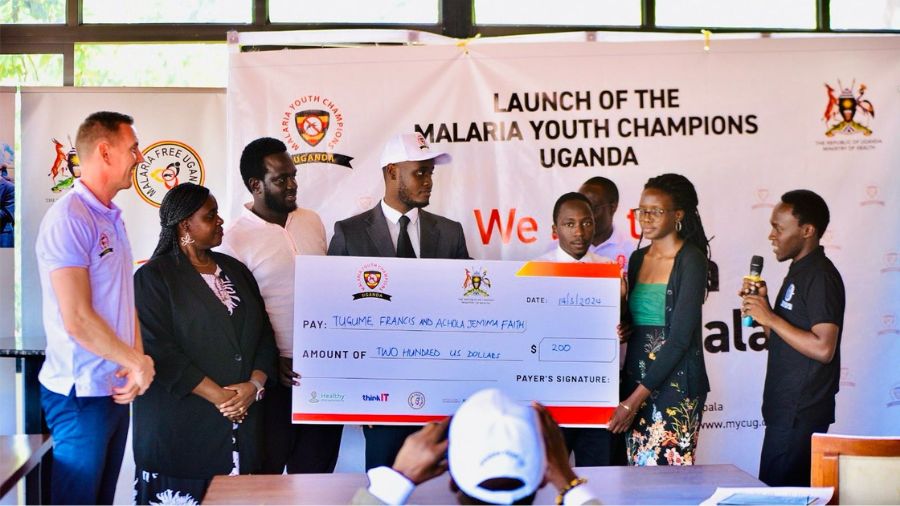ALMA congratulates Africa’s expanding network of youth champions fighting malaria, with Uganda as the newest member
Published: 14 March 2024
Uganda joins 5-African Union Member States that have established country Malaria Youth Corps, significantly increasing involvement of youth in the efforts to end malaria once and for all. Cameroon, Kenya, Zambia, Eswatini, and the Democratic Republic of Congo and now Uganda have established their youth corps, harnessing Africa’s demographic dividend.
The launch of the Uganda Malaria Youth Champions brings together energetic young people to tackle malaria in many ways: driving grassroots action and contributing significantly to advocacy, action, resource mobilization, and accountability at both national and sub-national levels. Using innovative approaches such as social media campaigns, use of scorecard tools and peer education programs, our youth will increase awareness and foster behavioural change within their communities.
Malaria is still the number one killer in Uganda, particularly among children. With more than 90% of our people at risk, this disease places a significant strain on our health system and severely impacts our socio-economic development. Today, we’re calling on our young people to step up and join this movement to fight malaria. This effort is crucial for improving our healthcare system as a whole and paving the way for sustainable economic growth and development.
Dr. Daniel Kyabayinze, Director of Public Health, Ministry of Health, Uganda
Malaria remains the primary cause of illness and mortality in Uganda, accounting for approximately 40% of all outpatient visits, 25% of hospital admissions, and 14% of all hospital deaths.

The establishment of the Malaria Youth Champions Uganda comes at a critical juncture in the fight against malaria, amidst a confluence of challenges. Africa continues to bear the heaviest burden of malaria worldwide, with 94% of global cases (233 million) and 95% of deaths (580,000). Financial constraints, biological threats such as drug and insecticide resistance, and the intensifying effects of climate change continue to threaten the gains made in combating malaria. Since 2015, progress in malaria reduction has plateaued, with Africa lagging in achieving the ambitious goals set by the African Union’s Catalytic Framework to End AIDS, TB, and Eliminate Malaria in Africa by 2030. A renewed impetus on integrated strategies, including youth engagement, is essential for effective malaria control.
Engaging the youth in the fight aligns with the African Union’s efforts to promote youth leadership, as outlined in the Africa Youth Charter and the African Union Roadmap on Harnessing the Demographic Dividend through Investments in Youth and Agenda 2063. It also aligns with the priority agenda of the chair of the African Leaders Malaria Alliance (ALMA), His Excellency, Umaro Sissoco Embaló, President of Guinea Bissau, which emphasizes the mobilization of Africa’s youth to win the battle against malaria.
With nearly 60% of Africa’s population under 25, young people are not just the future; they are the present in driving action for change, brimming with innovative ideas and solutions. We look forward to harnessing their energy and creativity to drive grassroots action, enhance advocacy, and contribute significantly to the fight against malaria.
Joy Phumaphi, Executive Secretary of ALMA
Inspired by the ALMA Youth Strategy, and the subsequent establishment of malaria youth corps in other African countries, the Malaria Youth Champions Uganda brings together a dynamic group of young Ugandans, trained through the ALMA Scorecard Hub. This training encompasses the integration of youth in strategies against not only malaria but also Neglected Tropical Diseases and achievement of universal health coverage goals. The ALMA Youth Strategy seeks to embed malaria efforts within existing youth frameworks at continental, regional, and national levels – ensuring that young people are deeply involved in the fight against malaria. Through the ‘Zero Malaria Starts with Me’ campaign and the push for Universal Health Coverage, the strategy encourages youth leadership in malaria eradication through advocacy, communication, and evidence-informed actions.
To date, malaria youth champions are active in 38 African countries, engaging in online platforms and grassroots movements. These champions serve as advocates for malaria elimination, evolving into leadership roles, amplifying and raising their voices to enhance government support, community urgency and global solidarity towards fully funding malaria elimination. Their efforts not only raise malaria awareness but also address broader health issues influenced by social factors and climate change.